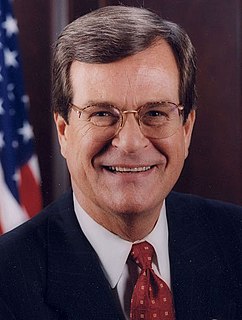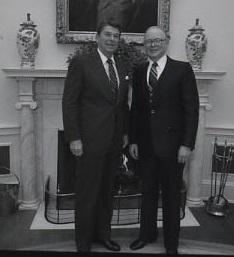
James Guy Tucker Jr. is an American lawyer and Arkansas political figure. A member of the Democratic Party, he served as the 43rd Governor of Arkansas, the 15th Lieutenant Governor of Arkansas, Arkansas Attorney General, and U.S. Representative. Tucker has been married to the former Betty Allen since 1975.
James Douglas Johnson, known as "Justice Jim" Johnson, was an Arkansas legislator; a losing candidate for governor of Arkansas in 1956; an associate justice of the Arkansas Supreme Court; the unsuccessful Democratic Party nominee for governor in 1966; and again a losing candidate for the United States Senate in 1968. A segregationist, Johnson was frequently compared to George Wallace of Alabama.

Young Timothy Hutchinson is an American Republican politician, lobbyist, and former United States senator from the state of Arkansas.

The 1998 United States Senate elections were held on November 3 and seen as an even contest between the Republican Party and Democratic Party. While the Democrats had to defend more seats up for election, Republican attacks on the morality of President Bill Clinton failed to connect with voters and anticipated Republican gains did not materialize. The Republicans picked up open seats in Ohio and Kentucky and narrowly defeated Democratic incumbent Carol Moseley Braun (Illinois), but these were cancelled out by the Democrats' gain of an open seat in Indiana and defeats of Republican Senators Al D'Amato and Lauch Faircloth. The balance of the Senate remained unchanged at 55–45 in favor of the Republicans. With Democrats gaining five seats in the House of Representatives, this marked the first time since 1934 that the out-of-presidency party failed to gain congressional seats in a mid-term election, and the first time since 1822 that the party not in control of the White House failed to gain seats in the mid-term election of a President's second term. These are the last senate elections that resulted in no net change in the balance of power.

There have been 90 gubernatorial elections in the state of New York since 1777. The next one will be held on November 3, 2022.
The Lieutenant Governor of Arkansas presides over the Arkansas Senate with a tie-breaking vote, serves as governor when the governor is out of state, and serves as governor if the governor is impeached, removed from office, dies or is otherwise unable to discharge the office's duties. The lieutenant governor position is elected separately from the governor.

The Arkansas gubernatorial election of 1980 was only that state's third election since Reconstruction when a Republican candidate won the governorship, and the first in which an incumbent was defeated.

The Arkansas gubernatorial election of 1978, held on November 7, was the first time that Bill Clinton was elected Governor of Arkansas.
Charlie Daniels is an American Democratic Party politician from Arkansas. He was the State Auditor of Arkansas from 2011 to 2015 and previously served as Arkansas Secretary of State, and as Commissioner of State Lands.
The following table indicates the party of elected officials in the U.S. state of Arkansas:

The Arkansas gubernatorial election of 1982 was the second since Reconstruction in which an incumbent was defeated; the preceding election was the first.

The 1966 Maine gubernatorial election took place on November 1, 1966. Incumbent Republican Governor John Reed, had been elected to finish the term of Clinton Clauson in 1960, was then re-elected in 1962 and became the state's first four-year Governor. Reed was seeking a second full four-year term, and was challenged by Democrat Kenneth M. Curtis. Curtis defeated Reed, beginning a twenty-year period of Republican isolation from the Blaine House.
Kim Dexter Hendren is a Republican currently serving in the Arkansas House of Representatives. He is a former member of the Arkansas State Senate who served as Minority Leader and chairman of the Energy Committee. Term-limited, he left the Senate in January 2013.
The 1802 United States Senate special election in New York was held on February 9, 1802, by the New York State Legislature to elect a U.S. Senator to represent the State of New York in the United States Senate.

Aylmer Lynn Lowe, known as A. Lynn Lowe, was an American farmer and politician from Garland near Texarkana in Miller County in southwestern Arkansas, who was a major figure in the Arkansas Republican Party. He was the Republican gubernatorial nominee in 1978 against the Democrat Bill Clinton, served as state party chairman from 1974 to 1980, and was the GOP candidate in Arkansas's 4th congressional district in 1966, having been defeated by the Democrat David Pryor, then a state representative and a future governor and U.S. Senator, originally from Camden in Ouachita County in south Arkansas.

The Arkansas gubernatorial election of 1984 was held on November 6, 1984. Incumbent Governor Bill Clinton won reelection with a 25% margin of victory over Jonesboro businessman Woody Freeman. This was the last gubernatorial election in Arkansas before the implementation of Amendment 63, lengthening the term of the governor of Arkansas from two to four years. Winning his third of five terms as Governor of Arkansas, Clinton continued to serve this office until shortly after he was elected to the presidency in 1992.

The Arkansas gubernatorial election of 1990 took place on November 6, 1990.

A general election was held in the U.S. state of Arkansas on November 4, 2014. All of Arkansas' executive officers were up for election as well as a United States Senate seat, and all of Arkansas' four seats in the United States House of Representatives. Primary elections were held on May 20, 2014 for offices that need to nominate candidates. Primary runoffs, necessary if no candidate wins a majority of the vote, were held on June 10, 2014.
















